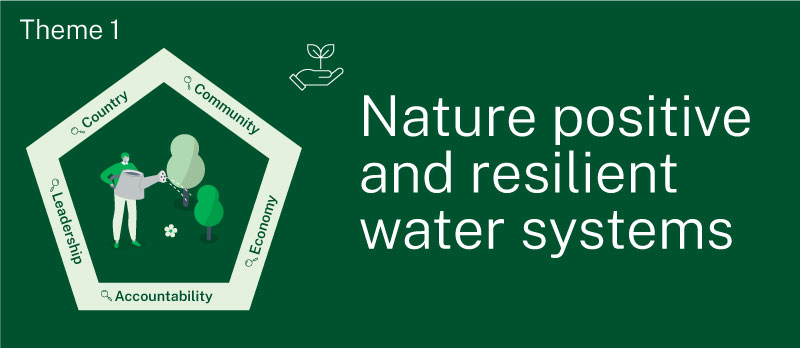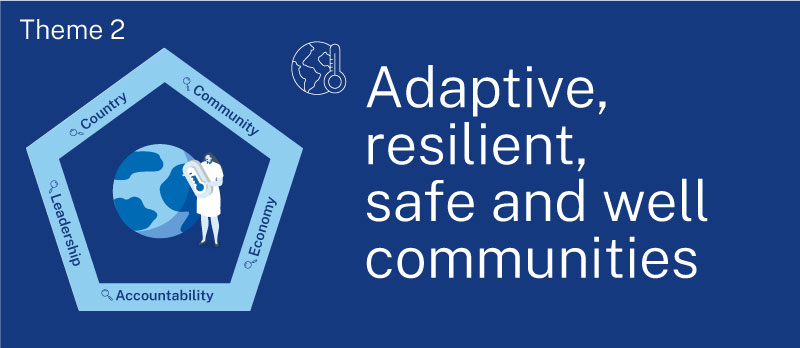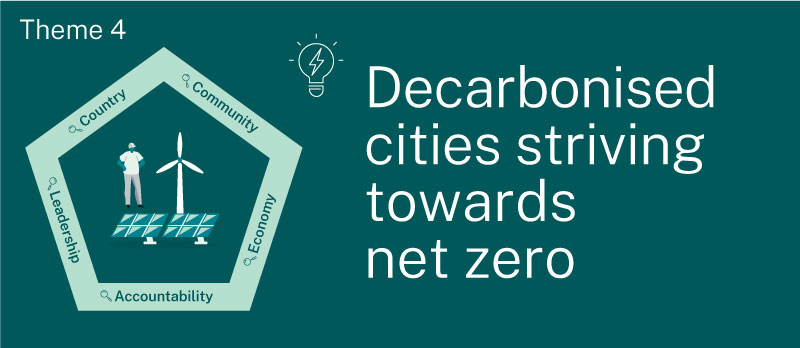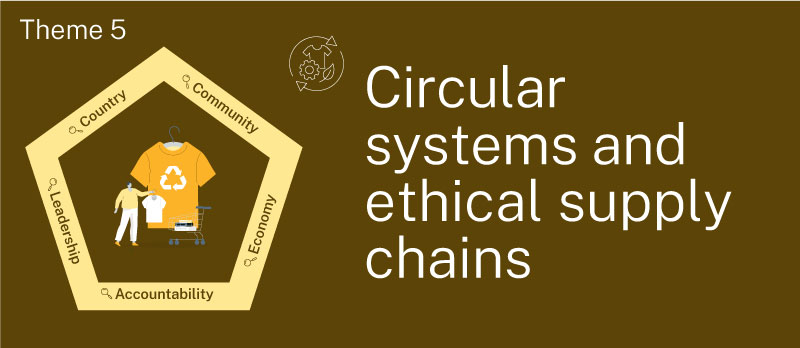Sustainability and Resilience Strategy - Objectives and Targets
In supporting the Parkland City’s natural systems, community wellbeing, and economic prosperity, these themes cannot be seen in isolation:
- Nature positive and resilient water systems
- Adaptive, resilient, safe, and well communities
- More equitable access to jobs, careers, and learning
- Decarbonised places striving towards net zero
- Circular systems and ethical supply chains

Our objectives
- Design landscaping to maximise cooling and provide community access to nature.
- Increase the canopy, mid and low-storey plantings in the public domain and on infrastructure.
- Diversify species selection to support healthy soil, plant, and animal diversity.
- Protect existing ecological systems and support research into climate adapted species.
- Maximise the retention of water in the landscape for passive irrigation and cooling and use recycled water wherever possible.
- Slow and clean stormwater to protect local waterways by integrating green infrastructure (for example, green roofs, swales, rain gardens, tree pits) into city structures.
- Work with partners to reduce water consumption while supporting urban greening.
Our targets
- Install bio-solar or solar PV panels on 100 per cent of available roof spaces.
- Deliver an average 40 per cent canopy cover.
- Reduce building water consumption by 45 per cent from pre BASIX levels.
- Integrate water sensitive urban design (WSUD) principles.
Our stretch targets
- Deliver an average 60 per cent green cover.
- Increase the type, quality, and diversity of species when transforming greenfield sites to urban places.
- Adopt WSUD and sponge-city design principles in building and place design.

Our objectives
- Design with Country, embedding First Nations knowledge and climate change risk assessment and mitigation actions within our delivery processes.
- Support connected and cohesive communities, able to respond to, and recover from, extreme events with appropriate infrastructure and services.
- Actively promote wellbeing and a good quality of life by creating and activating places that are safe, accessible, enjoyable, and inclusive for all, including First Nations people.
- Deliver world-class arts and cultural infrastructure that responds to diverse community needs, and attracts investment and tourism, showcasing the best of the Western Parkland City.
- Support Government initiatives for more affordable homes and reduce cost of living pressures through sustainability designed homes.
- Trial innovation in prefabricated and manufactured housing design, materials and technologies to support the development of new industries.
Our targets
- Minimum 5-star NABERS certified by the National Australian Built Environment Rating System.
- Minimum 5-star Green Star certified under the buildings and communities’ tools by the Green Building Council of Australia.
- Actively promote a program of local and regional events to diverse communities within 30- and 45-minute reach by public transport.
- Achieve or exceed the NSW Government’s policies to deliver a diversity of high density housing types, price-points, and tenures.
- Actively work to foster a positive and diverse work culture on our sites.
Our stretch targets
- 6-star NABERS certified by the National Australian Built Environment Rating System.
- 6-star Green Star certified under the buildings and communities’ tools by the Green Building Council of Australia.
- Certification under the Western Sydney Region of Council’s Cool Suburbs Tool.
- Facilitate a program of early activation initiatives, community, arts and cultural events and engagement.

Our objectives
- To promote wage equity between workers in Western Sydney and Sydney's east.
- Engage and collaborate with industry, schools, and the tertiary education sector to meet the education and training needs of industry and workers.
- Deliver targeted education opportunities and support new career paths in future-focused industries for all genders.
- Support community wellbeing and liveability through targeted career development, education and skills improvement pathways.
- Leverage our procurement spend to support the growth of local businesses, jobs creation and career paths and increase social value.
- Support positive cultural change in the construction industry through advocacy, education and engagement.
Our targets
- Deliver a minimum 40 new micro-credentials focused on the future skills and training needs of industry and the communities of Western Sydney.
- Achieve the target of 3 per cent Aboriginal representation at all non-executive salary levels.
- Utilise policy provisions that enable direct negotiation with, and engagement of, small and medium enterprises (SME), require first consideration of an SME and include in non-price evaluation criteria minimum SME participation.
In our developments and precincts:
- Publish annually an Aboriginal Participation Strategy to identify and address upcoming procurement opportunities and achieve the minimum requirement for 1.5 per cent Aboriginal participation in all contracts valued at $7.5m or above.
- Achieve the target of directing one per cent of addressable spend to Aboriginal businesses as part of our contribution to our cluster’s target.
- Achieve the target of a minimum of 3 per cent of total goods and services to Aboriginal businesses, which includes construction.
- Achieve or exceed NSW Government’s learning and skills targets in our procurement for applicable contracts, starting with a minimum:
- 8 per cent of the total project workforce aged less than 25 years
- women are to make up 2 per cent of the workforce in trade related work
- 20 per cent of the total labour force of a project to be made up of learning workers
- 20 per cent of all trades positions on a project to be made up of apprentices
- 30 per cent of all trade positions being local workers employed and trained.
Addressable spend means a category of spend where there are opportunities for agencies to engage Aboriginal businesses as identified by NSW Indigenous Chamber of Commerce and Supply Nation (e.g. construction, food and hospitality, office supplies and printing, facilities management, graphic design, recruitment and labour hire).
Non-addressable spend are very limited opportunities to engaged Aboriginal owned businesses (e.g. financial services, business case advisory and property transactions).
Our stretch targets
In our developments and precincts:
- Pilot procuring 1 per cent of total annual contract spend from social enterprises and direct employment of disadvantaged jobs seekers based in the Parkland City, and review with the intent of increasing this target if successful.

Our objectives
- Decarbonise our operations and supply chains through purchasing decisions.
- Electrify our developments, including providing infrastructure for onsite renewable energy generation and storage.
- Develop Bradfield City Centre with a diverse and innovative energy mix that is EV ready and minimises the polluting impacts of energy generation.
- Minimise the need for private vehicle movements into developments through master planning, smart city, and active transport design.
- Test and showcase innovation in low-embodied carbon materials, energy storage and efficient energy use technology
Our targets
- Net zero for Scope 1 and 2 emissions from BDA corporate activities by 2025.
In our developments and precincts:
- Achieve net zero emissions by 2025 for Scope 1 and 2 emissions
- Provide onsite renewable energy generation and storage.
- Allocate space for last mile logistics, e-vehicle charging and shared resource options.
- Install two EV charging stations in all buildings, or one EV charging station per 30 car parking spaces.
Our stretch targets
- Targeting the future inclusion of Scope 3 emissions through the development of a comprehensive net zero roadmap by 2026.

Our objectives
- Integrate circular economy infrastructure and land use planning across our developments through the master planning process.
- Develop a materials and procurement strategy that prioritises re-use, disassembly, non-composite materials, low or zero carbon materials, renewable resources, and recycled content.
- During design and construction, integrate circular economy principles of designing out waste and designing for disassembly, to avoid both construction and operational waste.
- Monitor ethical supply chain purchasing, particularly through major procurements for our developments and precincts.
Our targets
- Provide space allocation for makers spaces, reuse and repair centres and community facilities.
- Support a sharing economy by allocating space and encouraging shared transport and small tools and machines for day-to-day living.
- Full compliance with our obligations to ensure goods and services procured are not the product of modern slavery.
- Phase out or ban problem plastics in line with, or exceeding requirements of, the Plastic Reduction and Circular Economy Act 2021.
Our stretch targets
- 50 per cent reduction in construction waste generated from business as usual.
- 30 per cent reduction in waste generation per person, rising to 70 per cent by 2050.
- 50 per cent reduction in fit-out waste by weight.
- Collect 95 per cent of food waste for processing into higher value products.
- Design and operate a plastic waste free city